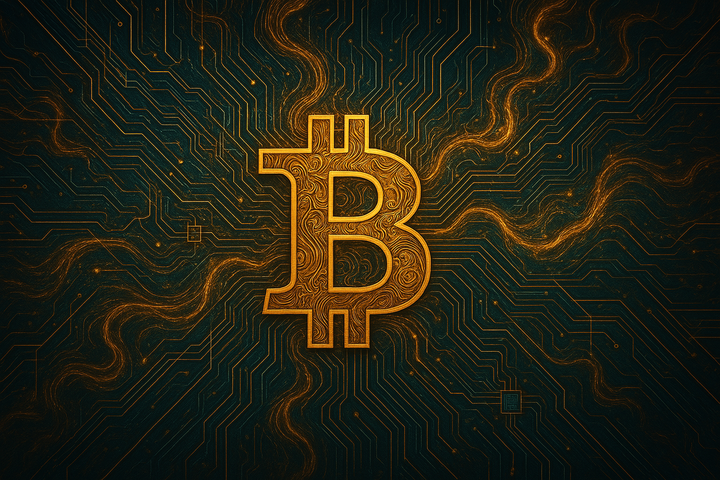Systemic Breakdown and Bitcoin Evolution
On April 12, 2025, the Anthony Pompliano Podcast featuring guest Jordi Visser explored dramatic declines in US bonds, stocks, and the dollar amidst global trade shifts. Visser questioned Bitcoin’s current portrayal as a NASDAQ asset and its potential to become a secure digital store of value.

- My 'briefing notes' summarize the content of podcast episodes; they do not reflect my own views.
- They contain (1) a summary of podcast content, (2) potential information gaps, and (3) some speculative views on wider Bitcoin implications.
- Pay attention to broadcast dates (I often summarize older episodes)
- Some episodes I summarize may be sponsored: don't trust, verify, if the information you are looking for is to be used for decision-making.
Summary
On April 12, 2025, the Anthony Pompliano Podcast featuring guest Jordi Visser explored dramatic declines in US bonds, stocks, and the dollar amidst global trade shifts. Visser questioned Bitcoin’s current portrayal as a NASDAQ asset and its potential to become a secure digital store of value. The discussion underscores the urgent need for effective policy interventions amid mounting geopolitical and technological pressures.
Take-Home Messages
- Market Instability: Traditional asset classes are experiencing simultaneous steep declines that signal a broader systemic breakdown.
- Bitcoin’s Evolving Role: Despite current perceptions, Bitcoin may transition into a reliable digital store of value as market conditions change.
- Policy Intervention: Timely and targeted government actions are critical to stabilizing financial markets during crises.
- Geopolitical Shifts: Escalating US-China tensions and fragmented global trade are reshaping international economic alliances.
- Technological Impact: Advances in AI and digital technologies are rapidly influencing economic structures and asset dynamics.
Overview
Jordi Visser begins by outlining the unprecedented market dislocation marked by a sharp decline in US bonds, stocks, and the dollar. He attributes these trends to systemic vulnerabilities reminiscent of emerging market crises and warns of far-reaching consequences.
He contrasts traditional safe havens with the current performance of Bitcoin, noting that gold is outperforming Bitcoin due to entrenched investor confidence. Visser explains that Bitcoin’s current classification as a NASDAQ-like asset may shift as market dynamics evolve.
The discussion then turns to global trade fragmentation and mounting geopolitical tensions, especially between the US and China. Visser emphasizes that these forces are fostering a new bipolar world that will redefine international economic relations.
Finally, Visser integrates the role of technology into the conversation, noting that AI’s deflationary potential and digital innovations could accelerate the transition toward decentralization. He posits that crisis-induced policy measures may catalyze a long-term reordering of financial systems.
Stakeholder Perspectives
- Institutional Investors are highly alert to unprecedented volatility and the erosion of traditional safe havens.
- Policymakers are under pressure to craft crisis-management measures that ensure financial stability while accommodating necessary reforms.
- Digital Asset Advocates see the emerging market dynamics as an opportunity for Bitcoin to redefine its role as a secure, digital store of value.
- Global Trade Analysts focus on the implications of US-China tensions and changing trade alliances for future economic arrangements.
- Technology Innovators are observing how AI and related advancements can disrupt traditional economic paradigms and reshape asset classes.
Implications and Future Outlook
The current market dislocation implies that traditional financial frameworks are under severe stress, necessitating swift policy interventions to avert a deeper crisis. Stakeholders across sectors will need to recalibrate risk management strategies as conventional safe havens lose their appeal. In this environment, stability hinges on the effectiveness and timeliness of regulatory responses.
With global trade and geopolitical fault lines shifting, a reordering of international economic alliances appears imminent. As the US-China rivalry intensifies, countries may increasingly favor decentralized and local solutions over established global systems. This realignment is likely to affect cross-border investment and trade flows significantly.
The integration of AI and digital technologies represents both an opportunity and a challenge. While these innovations promise to enhance efficiency and drive economic transformation, they also introduce new complexities into market dynamics. Decision-makers must balance technological adoption with robust safeguards to ensure sustainable growth.
Some Key Information Gaps
- What are the primary factors driving the unprecedented decline in US bond yields and the global capital structure? This inquiry targets the root causes of market instability and informs strategies to mitigate systemic risk while guiding policy decisions.
- Under what conditions could Bitcoin transform its market perception and emerge as a dependable store of value? Clarifying these conditions is crucial for aligning investor expectations and informing future digital asset integration.
- What geopolitical outcomes might arise from a transition to decentralized trade mechanisms? This question explores the potential reshaping of international economic relations amid shifting trade alliances.
- What policy measures could effectively stabilize the financial system in the face of systemic breakdowns? Understanding these measures is essential to formulate regulatory responses that balance crisis management with long-term economic stability.
- How can escalating US-China strategic tensions reshape global economic alliances and trade relationships? Investigating this issue will shed light on the future trajectory of international cooperation and economic realignments.
Broader Implications for Bitcoin
Bitcoin as a Strategic Reserve
The discussion suggests that as traditional assets falter, Bitcoin could eventually be viewed as a strategic digital reserve. This implies a shift in market dynamics where decentralized assets gain prominence over legacy instruments. The transformation may prompt policymakers and investors to reassess asset allocation strategies on a global scale.
Decentralization and Global Financial Realignment
The breakdown in conventional financial structures coupled with fragmented global trade signals a move toward decentralization. As national and regional economic policies diverge, a decentralized financial framework could emerge to better manage local risks. This realignment has the potential to democratize financial power and recalibrate global economic hierarchies.
Technology-Driven Market Transformation
Advancements in AI and digital innovations are poised to redefine economic structures by introducing new efficiencies and risk profiles. These technologies may accelerate the adoption of decentralized systems, further shifting the basis of market value. Their integration into financial markets could prompt widespread rethinking of regulatory, investment, and operational strategies.



Comments ()